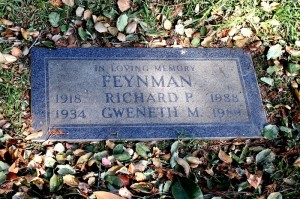There is little argument that Nobel laureate Richard Feynman was one of the greatest thinkers of his time. Tim Ferriss posted a YouTube video on his blog of Feynman’s interview for the BBC program Horizons. Tim quotes Professor Sir Harry Kroto, recipient of the Nobel Prize for Chemistry who said about this Horizons program:
“The 1981 Feynman Horizon is the best science program I have ever seen. This is not just my opinion – it is also the opinion of many of the best scientists that I know who have seen the program… It should be mandatory viewing for all students, whether they be science or arts students.”
Towards the end of the program Feynman talked about the negative ramifications of the success of real science and for some reason chose to talk about nutrition as an example for “pseudoscience”. Since it ties so well to my previous post: “Can anecdotes and history match science in guiding Paleo nutrition?” I couldn’t resist transcribing every word of that part of the program starting at 42:50.
Feynman: “Because of the success of science there is a kind of a…I think a kind of pseudoscience, social science is an example of a science which is not a science. They don’t do scientific…they follow the forms…you gather data, you do so and so and so forth but they don’t get any laws, they haven’t found anything, they haven’t got anywhere yet, maybe someday they will but it’s not very well developed, but what happens is…even on a more mundane level we get experts on everything. They sound like a sort of scientific experts. They are not scientists. They sit at the typewriter and make up something like: “food grown with fertilizer that’s organic is better for you than food that’s grown with fertilizer that’s inorganic”. Maybe true but it hasn’t been demonstrated one way or the other but they sit there on the typewriter and make up all that stuff as if its science and then become experts on food, organic foods and so on. There is all kind of myths and pseudoscience all over the place. Now’ I might be quite wrong, maybe they do know all these things but I don’t think I’m wrong. You see, I have the advantage of having found out how hard it is to know something, how careful you have to be about checking the experiments, how easy it is to make mistakes and fool yourself. I know what it means to know something and therefore I can’t…I see how they get their information and I can’t believe that they know it. They haven’t done the work necessary, haven’t done the checks necessary, haven’t done the care necessary. I have a great suspicion that they don’t know that this stuff is…and they are intimidating people by it. I think so. I don’t know the world very well…that’s what I think”.
I don’t know why but the figure of Walter Willett was constantly on my mind when I listened to this part and I also thought a lot about Gerry Taubes and that there must be something about physics training that leads to intolerance toward misrepresentation of the unknown as known.
The program was recorded in 1981. In 1986 Feynman was a key member of the Rogers commission of enquiry into the space shuttle Challenger disaster and is said to have personally found the cause of the explosion. It is a pity they didn’t set up a commission of enquiry with Feynman as a key member to investigate the disaster called “The USDA Dietary Guidelines”. It is few order of magnitude worse and many more lives could have been saved.
Last year I attended a lecture here in Israel by Professor Joanne Slavin, who was chairwoman of the “carbohydrates and proteins” section of the 2010 Dietary Guidelines Advisory Committee
Apparently she agrees with Feynman as she, a professor of nutrition, bluntly said that there is no scientific justification whatsoever for the committee recommendations. Unfortunately Jimmy Moore, prompted by my report, was not able to get her to interview for his podcast. I suppose she didn’t feel like repeating that statement in the U.S.
Well, not everyone is as courageous as Richard Feynman who bypassed Rogers and came out publicly with the results of his enquiry bringing Rogers to say that “Feynman is becoming a real pain”.
Referring to scientists who follow evolution as a guideline another physicist, John Tyndall, said in the 19th century: “They have but one desire—to know the truth. They have but one fear—to believe a lie”.
Here is a simple test for a true scientist – one desire and one desire only, one fear and one fear only.







 I am a Ph.D. in archaeology, affiliated with the department of Archaeology of Tel Aviv University. I research the connection between human evolution and nutrition throughout human prehistory.
I am a Ph.D. in archaeology, affiliated with the department of Archaeology of Tel Aviv University. I research the connection between human evolution and nutrition throughout human prehistory.
